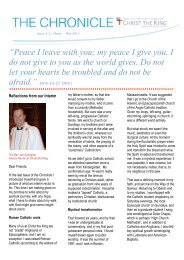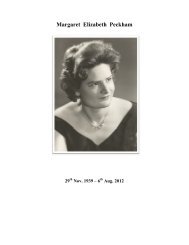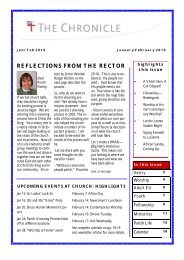God gave us his only Son, what can we offer? Giving - Christ the King
God gave us his only Son, what can we offer? Giving - Christ the King
God gave us his only Son, what can we offer? Giving - Christ the King
You also want an ePaper? Increase the reach of your titles
YUMPU automatically turns print PDFs into web optimized ePapers that Google loves.
p a ge 4 T H E C H R O N I C L E | W H E R E W E A R E N O W | Parish Newsletter<br />
Frankfurt, December 2010 – January 2011<br />
When he queried <strong>his</strong> translator<br />
he was told, “You did not<br />
ask!” The translator had neglected<br />
to convey <strong>the</strong> final line<br />
of each person’s commentary:<br />
»Bro<strong>the</strong>rs and sisters pray<br />
for me, that I might better<br />
understand <strong>the</strong> Scripture.«<br />
Do <strong>we</strong> need one ano<strong>the</strong>r<br />
in order to understand our<br />
sacred texts? Given its central<br />
role in <strong>the</strong> <strong>Christ</strong>ian faith, one<br />
would expect <strong>the</strong> Bible to be<br />
a source of unity. Too often,<br />
h o w e v e r, <strong>Christ</strong>ians loudly<br />
disagree on a variety of issues,<br />
<strong>the</strong>ir <strong>only</strong> commonality<br />
being that <strong>the</strong>y all cite scripture<br />
to j<strong>us</strong>tify <strong>the</strong>ir conflicting<br />
positions.<br />
Some observers simply<br />
conclude that <strong>the</strong> Bible <strong>can</strong><br />
be <strong>us</strong>ed to prove any point<br />
and is <strong>the</strong>refore meaningless.<br />
A growing number of o<strong>the</strong>rs,<br />
like Patte, see <strong>the</strong> challenge<br />
d i ff e r e n t l y. They believe that<br />
through an overemphasis on<br />
private interpretation and<br />
Bible study conducted <strong>only</strong><br />
among <strong>the</strong> like-minded, <strong>we</strong><br />
have forgotten that <strong>the</strong> Bible’s<br />
creation, reception, and ongoing<br />
interpretation are inherently<br />
communal.<br />
» S c r i p t u r e ’s a community<br />
book,« says Sister Te r e s a<br />
Okure, professor of New Testament<br />
at <strong>the</strong> Catholic Institute<br />
of West Africa. “Individuals<br />
may have written it, but it’s<br />
a community that accepted<br />
it. And <strong>the</strong> community said,<br />
‘T<strong>his</strong> is <strong>what</strong> really expresses<br />
our faith.’ So <strong>we</strong> really do<br />
need one ano<strong>the</strong>r to be able<br />
to understand.”<br />
<strong>Christ</strong>mas<br />
in <strong>the</strong> tropics –<br />
Ve n e z u e l a<br />
Submitted by Tina Banerjee<br />
C h i t t o m<br />
I have little sympathy for<br />
<strong>the</strong> protagonist of “I’m Dreaming<br />
of a White <strong>Christ</strong>mas”.<br />
For a large portion of my<br />
early life a white <strong>Christ</strong>mas<br />
was but a dream and yet, even<br />
as an oil brat in Ve n e z u e l a ,<br />
<strong>Christ</strong>mas managed to be<br />
really “<strong>Christ</strong>massey” in spite<br />
of <strong>the</strong> fact that I had to get<br />
<strong>us</strong>ed to <strong>the</strong> local c<strong>us</strong>toms.<br />
<strong>Christ</strong>mas trees existed in<br />
Venezuela, an import from<br />
<strong>the</strong> “gringos”, and <strong>the</strong>y <strong>we</strong>re<br />
being sold everywhere along<br />
<strong>the</strong> roads. The traditional<br />
<strong>Christ</strong>mas decoration, ho<strong>we</strong><br />
v e r, was <strong>the</strong> nativity<br />
scene. Derived<br />
from <strong>the</strong><br />
Spanish c<strong>us</strong>tom,<br />
“el<br />
p e s e b r e ”<br />
c o n s i s t e d<br />
of <strong>the</strong><br />
m a n g e r<br />
with Mary,<br />
J o s e p h ,<br />
baby Jes<strong>us</strong><br />
and <strong>the</strong> mule<br />
and ox. In<br />
Venezuela, <strong>the</strong> traditional<br />
bringer of “Niño Jesús”,<br />
who was increasingly faced<br />
with tough competition from<br />
“Sahnta Close” (Santa Cla<strong>us</strong>).<br />
The <strong>only</strong> hint of a “white<br />
<strong>Christ</strong>mas”, albeit in a completely<br />
different sense, was<br />
<strong>the</strong> ponche crema, a sort of<br />
eggnog traditionally drunk<br />
at <strong>Christ</strong>mas, made of milk,<br />
eggs, sugar and rum, to go<br />
with “hallacas”, <strong>the</strong> traditional<br />
Venezuelan <strong>Christ</strong>mas<br />
dish. Hallacas are a sort of<br />
pastry made out of maize<br />
(corn) dough and filled with<br />
capers, olives and meat, wrapped<br />
in plaintain leaves, and<br />
b o i l e d .<br />
When <strong>the</strong> season came<br />
around at <strong>the</strong> private Spanishspeaking<br />
school I attended,<br />
peace on Earth and goodwill<br />
really did seem to reign for<br />
that short period. There <strong>we</strong>re<br />
almost no regular classes,<br />
and <strong>we</strong> all made<br />
“ h a l l a c a s ”<br />
t o g e t h e r.<br />
The whole school put on a<br />
pageant for <strong>the</strong> parents with<br />
<strong>us</strong> dressed as characters from<br />
<strong>the</strong> Bible, <strong>we</strong> would parade<br />
singing “aguinaldos”, which<br />
are Venezuelan carols accompanied<br />
by <strong>the</strong> typical<br />
Venezuelan instrument, <strong>the</strong><br />
“cuatro”, akin to <strong>the</strong> ukulele.<br />
No “Happy Holidays” or<br />
Hallacas is <strong>the</strong><br />
traditional Venezuelan<br />
<strong>Christ</strong>mas dish, here<br />
seen before being<br />
wrapped in cornmeal<br />
and plantain leaves<br />
for cooking<br />
o b s c u ring <strong>the</strong> origin of<br />
C h r i s t m a s .<br />
Maybe all t<strong>his</strong> nostalgia<br />
is why my eyes grew misty<br />
when I recently re-d i s c o vered<br />
a Venezuelan carol on<br />
youtube: “Vámonos pastores,<br />
vamos a Belén, a ver<br />
a Maria y al niño también”<br />
(Shepherds hence to Bethlehem,<br />
to see Mary and <strong>the</strong><br />
C h i l d ).





